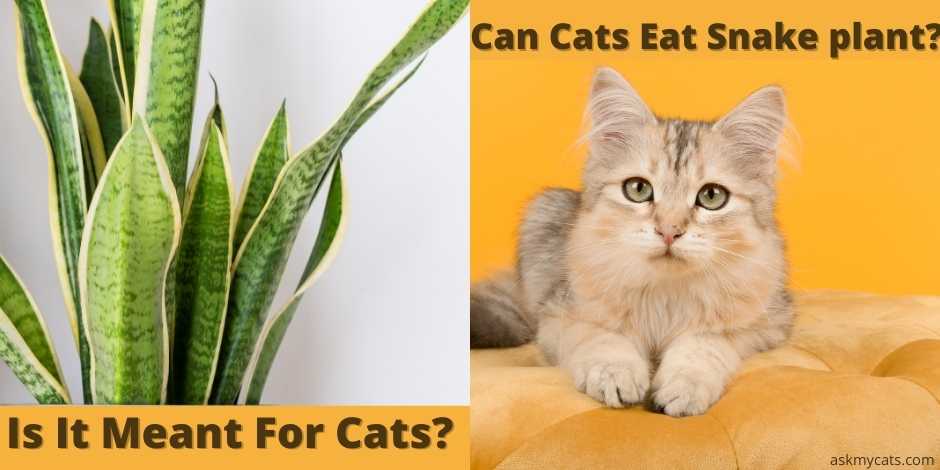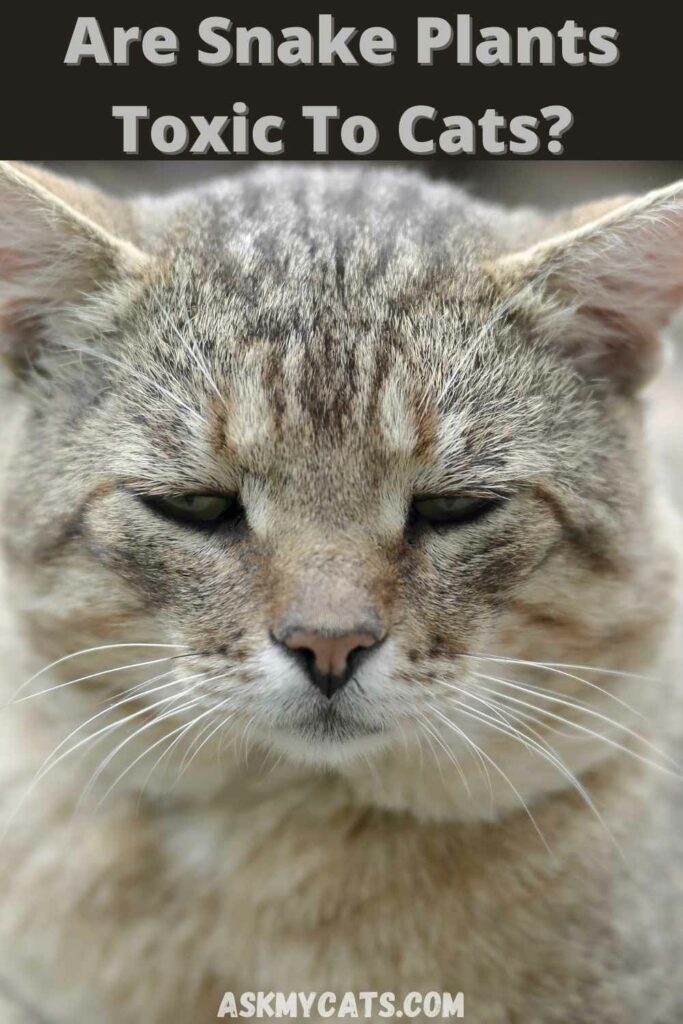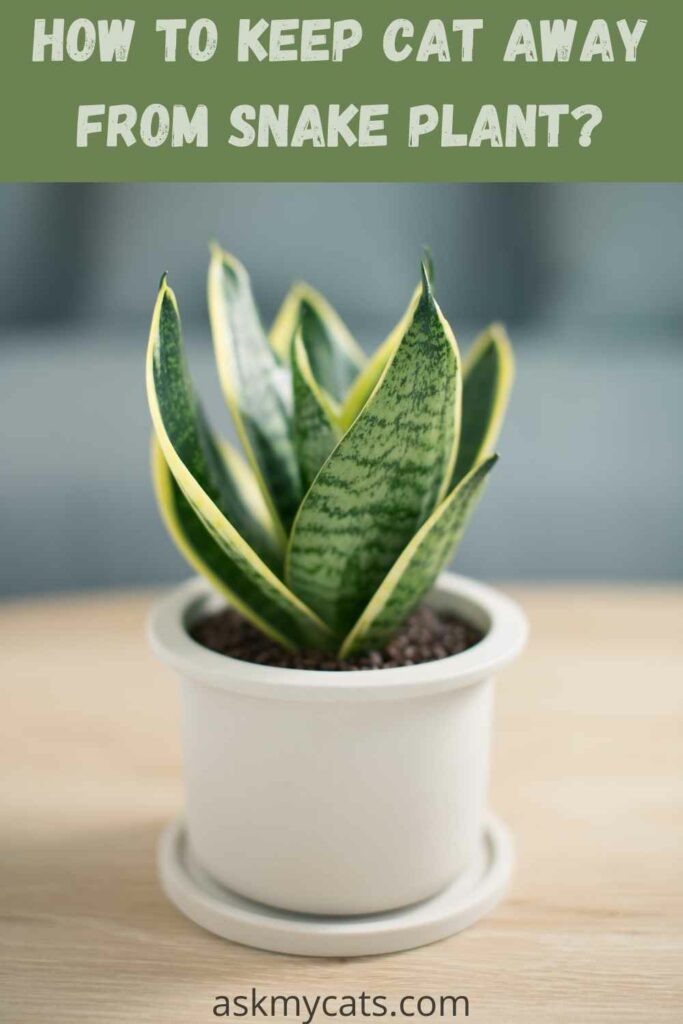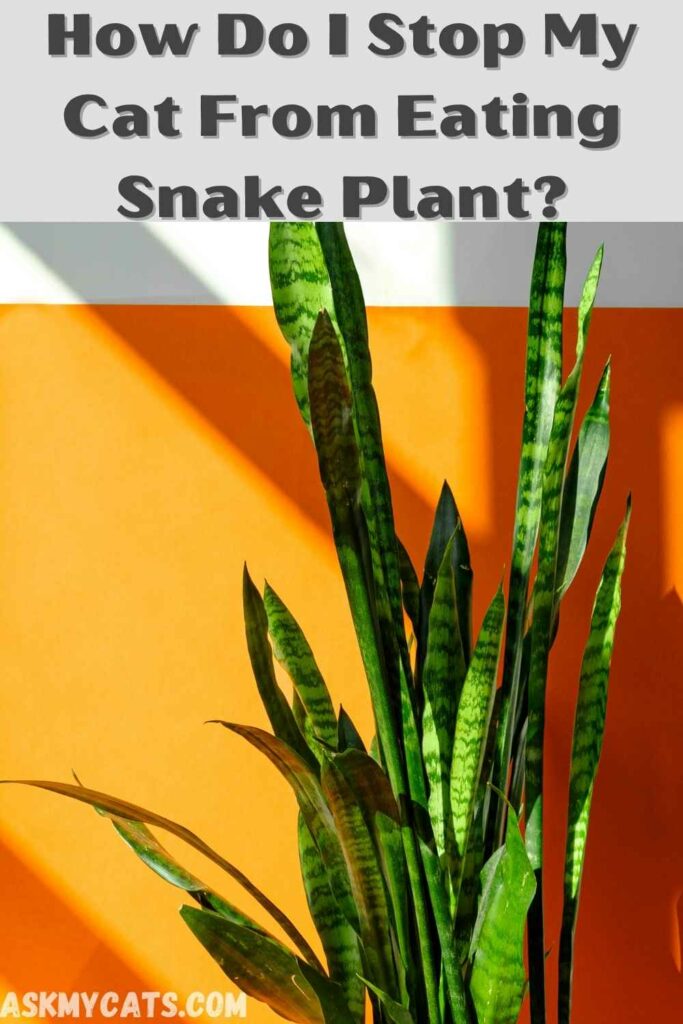Personally, I like to keep my house well maintained and embellished with every kind of goodness. When it comes to doing so, I keep a check on every little thing, and what better than keeping some indoor plants that diversify and beautifies the whole vibe of the house?
But, I often wonder about my little felines who are so inquisitive and will do everything in their power to get a bite of it and be around them as much as they can. Being a cat mom, I am sometimes amused and also startled by contemplating what if some plants turn out to be toxic?
Exactly, you guessed it right. Today’s topic is going to revolve around such a homegrown plant that is a snake plant. I know you people are now on verges to find the answers.
In short, snake plants are toxic for cats and you should keep them away from your feline as much as you can because it carries the possibility of ending up in stomach complications.
Hold on to your pens and diaries and let’s dwell further.


Give Your Cat the Perfect Day
Get the Free Ebook!
Are Snake Plants Toxic To Cats?
Yes, snake plants are toxic for cats and have the vast possibility of giving your cat mild allergies and stomach aches.
Cats are prone to eat plants because of their likeliness towards green and also because they supplement their diets by eating plants around them to get fiber and nutrients.
You must be wondering how it’s not advisable for cats and so to say toxic for cats, it is because it comprises of chemical compounds namely Saponins which can result in nausea, diarrhea, and vomiting If your cat seems to consume it.
Being a cat parent, it’s imperative to keep a check on every little thing that goes around the house because cats being extremely sensitive pets tend to get harmed or affected by even little of the little things, it should be your prime or sole duty to get everything analyzed before putting it your cat’s eager sight.
Furthermore, snake plants cannot possess extreme toxicity for your cats and will majorly end up in a few mild reactions that can be treated or in the worst situations will deserve a veterinary consultation.
To make your quest a little short, I am about to mention some reactions or signs that should tell you your cat has ingested a snake plant, keep looking.
- Diarrhea
- Vomiting
- Depression
- Nausea
- Abdominal pain
- Loss of appetite
- Drooling
- Swelling in lips, mouth, etc.
If these signs are pretty evident and persisting even after a few days, get a vet consultation before the situation escalates.
Can Snake Plants Kill Cats?
No, snake plants don’t have such toxic contents that can kill your cat.

Though until now we have known that toxicity is mild in snake plants but you cannot rule out the probability of it being harsh on your feline’s stomach and turning out to become major complications.
Usually, if your cat happens to ingest or bite some parts of the snake plant, lethargy and reluctance to eat are the initial stages your feline will put forward.
Diarrhea and nausea can later follow. In such situations when you are the sole witness of seeing your cat eating snake plant, make sure your feline vomits immediately after that.
If not, it can be sometimes pretty serious if your cat has existing underlying issues, even mild toxicity can trigger your cat’s vital organs to initiate no response which can be a severe complication.
The thing to keep in mind here is that if your cat ends up eating the whole plant or in regular intervals, it can make your cat severely ill and the moderate toxicity will graciously increase itself.
In addition, make sure the snake plant your cat has eaten is completely removed from your cat’s mouth before taking any actions.
This must be the first question that must have popped up on your mind, I know. It’s completely normal to feel vulnerable and agitated in some occurrences, but try to act well, because when you took responsibility for that little furry baby, the obligation to put emotions in the back seat came as an addition.
What Happens If My Cat Eats Snake Plants?
Nothing severe is likely to happen to your cat if it eats snake plant but some initial stages of recognizing the snake poisoning are nausea, diarrhea, and vomiting.
The thing that I should mention here is, that if your cat has vomited immediately after eating the snake plant, it is a good sign.
It shows that your feline has puked out all the potential toxicity out of their mouths and the period of recovering is much shorter now.
But If the vomiting continues, vet consultation might be essential because there are mild chances of the toxicity overlapping with your feline’s underlying health status, if any.
Although, nothing severe is likely to happen it’s always better to take the utmost precautions.
Try to not make the area in which you have kept the snake plant be accessible to your feline as it the only safest way to keep your cat from eating snake plants.
Furthermore, it’s likely that your cat will not ingest snake plants in large amounts because of its bitterness, which I good thing for all the cat parents as the possibility of the situation escalating is quite low here. Congratulations!
Can I Have A Snake Plant With A Cat?
It’s not advisable to keep snake plants with a cat together because snake plants do have some toxic applications.
It should be brought to you that snake plants are not cat-friendly and should be kept at bay from your cat and even from your house too if you own a beautiful furry baby.
But, don’t get disheartened. If you are a plant lover and do want to adorn your house with some amazing plants, then your top priority should be to make it friendly to your cat. By friendly, it simply means to opt for the green plants that are free from any toxicity and harmful pathogens which can ill-treat your feline.
I would like to mention some of such plants that you can go for without having any further doubt and navigate in both the boats of loving plants and also your little furry baby, come see?
- Palms
- Christmas cactus
- African violet
- Baby tears
What are you waiting for? Go to the nearest nursery and adopt a beautiful companion for your kitty.
How To Keep Cat Away From Snake Plant?
Seeing your cat desperately around the snake plant when you have tried every way to keep them away from it, I know it must be excruciating, below are some mentioned ways you can checklist if you want to keep your cat from snake plant.
But let me step in, and bring in some ways through which you can keep your cat away from snake plants for once and for all.

1. Use Scent As Deterrents
You must be familiar with the fact that cats are very particular about the scents they happen to be around. they cannot tolerate certain scents.
You can try to keep them away from the snake plant by using those certain scents to deter the cat away from that particular region where the snake plant of your house is situated.
Some of such deters can be citrus peels, tea leaves, and raw onions.
2. Keep The Area Inaccessible
The best thing to do is, to choose such an area where your cat is very unlikely to visit and hang around.
Usually, cats are very impulsive and territorial which means you shouldn’t keep it anywhere near to the spot they live in or somewhat near to you as you are part of their dynasty.
In such cases, opt for balconies and terraces of your house to keep the snake plant, keeping snake plants indoor should be refrained from, sorry.
3.Unlikable To Few Plants
Yes, this might come to you as a shock but this is what it is. Cats are not very fond of some plants such as lavender, marigolds, rue. Cats are usually intolerant to these plants.
What you can do is, try to surround the area where you have kept your snake plants with some of these plants which will repel your cat from coming near to the snake plant.
try to use these methods and tell me which one worked.
How Do I Stop My Cat From Eating Snake Plant?
There are some ways that most people make use of when it comes to keeping cats away from eating plants which I hope also works in your case.
I am mentioning some of such ways below which would help you in coping up with such an occurrence.

1. Hang the snake plant From The Ceiling
The best way to keep your cat from eating snake plant is to hang it from the ceiling which will make it inaccessible for your cat making it outgrow the habit of eating the plant eventually.
2. Use Cat Repellent
Another useful thing you can do is to spray cat repellent sprays that are easily found and can make your cat less prone to hang around the snake plant.
Here, you also need to check the contents mentioned in the cat repellent spray because some of the used substances can be harmful to your little feline.
3. Use An Unpleasant Surface
Cats are likely to hang around the snake plant more because of the immaculate way in which you have kept the plant in the most desirable area for your kitty.
Try to move the plant further away and use a not so likable surface or cloth that your feline doesn’t like. You can try to use tin foil to apply this method.
4. Don’t Punish
The last and only way through which you can keep your cat from eating the snake plant is to not punish them.
Punishing them will increase their likeliness towards the snake plant which will make them try new ways to get a bite of the toxic plant. It will also refrain your cat from forming a bond with you.
What Are The Plants That Are Toxic For Cats And Why?
After ending the whole session related to snake plants, it’s also essential for me to also bring out some more plants to you that can be harmful to your cats and which comprise vast toxicity to your kitty, have a vivid look below.
1. Peace Lilies
You are very likely to develop admiration for these plans because of their white flower but let me tell you it can be toxic for your cats if it ingests them.
Peace lilies contain calcium oxalates that can give your feline diarrhea, vomiting, excessive drooling, irritation to the mouth, GT tract which can also further escalate if it’s swallowed in larger amounts.
2. Aloe Vera
Aloe Vera is indeed the choice of many households because of its soothing properties, but it can be toxic and hazardous for cats because of the composition of saponins and anthraquinones that can give your cat vomiting, diarrhea, and stomach aches if ingested in larger amounts.
3. Dumb Cane
Another houseplant that is common to be found in many households without knowing about its toxic presence can harm the little furry babies.
Dumb cane consists of insoluble calcium oxalates and proteolytic enzymes that can give your cat oral irritation, swelling, burning of the mouth, etc.
What Are The Plants That Are Non-Toxic To Cats?
Enough with bringing all the negative to get your glimpse. I don’t want to keep you from adorning your house with beautiful houseplants.
Don’t worry, I have brought some plants that are non-toxic for your cats and which are in some way or the other help for your little feline.
Without any more blabbering, let’s get in buddies.
- Aspidistra
- Howea
- Nephrolepis
- Calathea
- Pilea
These are some plants that you can look for in the plant nursery that are non-toxic for your cats which will keep you away from all the apprehensions you end up having.
Breathe, buddies.
Frequently Asked Questions
What are the plants that are cat-friendly?
Some of the cat-friendly plants are basil, dill, mint, and parsley which are just not non-toxic but also healthy for your little feline.
Is bamboo harmful to cats?
Bamboo can be dangerous for your cat if ingested and give your feline diarrhea, vomiting, drooling, and loss of appetite.
Final Words
At the end of the article, we have come to a brief conclusion that snake plants are toxic for your cats and should be kept at a distance from them. You must wonder that it carries mild toxicity as mentioned all along with the article, nonetheless, it should be kept away as anything can disrupt your feline’s health.
You should always opt for cat-friendly plants to keep all the contemplations away from you and your cat.
Allow my words to be put on a halt, but before that, I would like to drop in a question for you all to ponder your deep thoughts and then pours it all in the comments section below.
Okay, so when was the first time you saw your plant eat snake plant? What were your immediate thoughts? What cure did you use?
Come, let’s meet up in the comment box.
